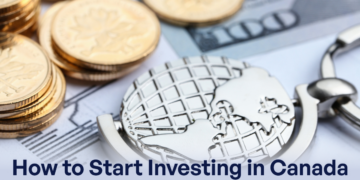Tips for Those Who Want to Start Investing Abroad While Living in Canada

Expanding Your Investment Horizons
Investing beyond Canadian borders offers Canadians a unique chance to enhance their financial portfolios significantly. By looking internationally, you can gain exposure to diverse opportunities that may not be available domestically. This expansion can be exciting and potentially lucrative, but it’s essential to approach it with knowledge and caution.
Global Market Trends
One of the primary advantages of investing internationally is the ability to tap into global market trends. For example, countries like India and Brazil are experiencing rapid economic growth due to their burgeoning middle classes and robust technology sectors. By investing in companies based in these emerging markets, Canadians can benefit from higher growth rates than what might be experienced in more mature economies like Canada and the United States.
Currency Diversification
Currency diversification is another pivotal aspect of international investing. Currency fluctuations can significantly impact investment returns. For instance, if the Canadian dollar weakens against the euro or the pound, Canadian investors might find that their foreign investments gain value in CAD terms, even if the local market performs relatively flat. This creates a natural hedge against local currency risks and adds another layer of security to your investment strategy.
Broader Asset Choices
International investing also allows access to a wider range of assets, making it easier to explore various sectors and industries. For example, if you invest in electric vehicle companies headquartered in Norway or innovative tech startups in Silicon Valley, your portfolio becomes more diversified. This diversification can reduce risk because different markets can respond differently to economic changes, potentially stabilizing returns over time.
Understanding the Risks
Nonetheless, venturing outside familiar financial waters necessitates thorough preparation. A critical consideration is the tax implications of your foreign investments. Different countries have varying taxation laws, which means that understanding how foreign capital gains taxes, estate taxes, or dividend taxes apply is crucial to determining your net returns. Consulting a financial advisor or tax professional familiar with international investments can help navigate this complexity.
Economic and Regulatory Factors
Evaluating economic factors in the target country is vital as well. Factors like political stability, economic growth rates, and inflation can affect investment viability. For example, a politically unstable region might have high risks associated with investing, which could negate potential gains. Additionally, understanding the regulatory environment is essential; different countries have distinct laws governing foreign investments. Familiarizing yourself with these regulations can prevent legal complications and unexpected barriers to accessing your investments.
In conclusion, international investments can provide Canadians with vibrant opportunities for wealth growth. Whether your interest lies in real estate, stocks, or mutual funds, the journey can be financially rewarding if approached with careful planning and thorough understanding. By equipping yourself with knowledge about global markets, tax implications, and economic conditions, you can make informed decisions that enhance your investment strategy while navigating the complexities of the overseas investment landscape.
SEE ALSO: Click here to read another article
Key Considerations Before Investing Abroad
Before diving into the world of international investments, there are several crucial considerations that Canadians should keep in mind. Starting with a solid foundation is essential for any investment strategy, especially when venturing into foreign markets. Below are some critical tips to help guide your journey:
Research the Market
Conducting in-depth market research is a vital step in become successful at international investing. Each country comes with its own distinct economic environment, cultural practices, and consumer behaviors that impact business performance. For example, while investing in technology stocks in South Korea could be promising due to its innovation-driven economy, sectors can vary wildly in terms of volatility. Take time to understand local market dynamics, industry trends, and the performance of specific sectors before making investments.
Develop a Strategic Plan
An effective investment strategy will serve as your roadmap as you navigate the complexities of international investing. Consider the following elements when developing your strategic plan:
- Investment Goals: Determine what you want to achieve through investing abroad, whether it’s capital appreciation, diversification, or income generation.
- Risk Tolerance: Assess how much risk you are comfortable taking and adjust your investments accordingly. Emerging markets can present higher risks and potential rewards.
- Time Horizon: Clarify your investment timeline. Are you looking for short-term gains or long-term growth? This will influence your choice of assets.
Choose the Right Investment Vehicles
There are various investment vehicles available for investing abroad, each with its benefits and drawbacks. Here are a few options you might consider:
- Direct Stock Purchases: Buying shares in foreign companies directly allows you to own a piece of the company but requires deeper due diligence.
- Exchange-Traded Funds (ETFs): These funds, which can offer exposure to foreign markets without requiring extensive research, could be an excellent way for newcomers to start investing internationally.
- Mutual Funds: Similar to ETFs, mutual funds can provide access to a diversified portfolio managed by professionals in global markets.
Stay Informed on Geopolitical Stability
Geopolitical stability can greatly impact your investments abroad. Sudden changes in government policies, trade relations, or risks from conflicts can lead to market volatility. It’s essential to stay informed about the political climate and economic regulations in the countries you are interested in. For example, an unexpected political upheaval can affect both currency values and the performance of businesses operating in that territory.
In summary, international investing can be a rewarding venture for Canadians looking to broaden their financial horizons. By conducting thorough research, developing a strategic plan, selecting the appropriate investment vehicles, and staying informed about geopolitical factors, you can position yourself for success as you explore investment opportunities outside Canada.
CHECK OUT: Click here to explore more
Understanding Currency Risk and Exchange Rates
When investing abroad, it’s essential to grasp the concept of currency risk. Currency fluctuations can have a significant impact on your investment returns, particularly if the Canadian dollar is strong relative to the foreign currency. For instance, if you invest in a European stock and the Euro weakens against the Canadian dollar, the value of your investment could decrease even if the stock price rises. Conversely, if the Euro strengthens, you might see enhanced returns when converting profits back to Canadian currency.
Hedging Currency Risks
To mitigate potential losses from currency fluctuations, investors can consider hedging strategies. Hedging involves taking a position in a currency to offset potential losses in another investment. Some financial institutions offer currency hedged ETFs or mutual funds that automatically lessen currency risk, making them suitable options for novice investors. Exploring these strategies can provide additional peace of mind when venturing into foreign markets.
Understand Tax Implications
Before making any international investments, familiarize yourself with the tax implications that come with them. Canadians are taxed on their worldwide income, which means any dividends or capital gains earned from foreign investments will generally be subject to Canadian tax laws. In addition, some countries may impose withholding taxes on dividends, which could affect your overall returns. It’s wise to consult with a tax professional who understands international tax laws to ensure you fully grasp how taxes may impact your investment strategy.
Utilize Professional Guidance
Given the complexity of international investing, seeking professional guidance can be invaluable. Financial advisors with expertise in global markets can provide insights into market trends, currency fluctuations, and regulatory challenges. They may also help in assembling a diversified portfolio that aligns with your investment goals and risk tolerance. When searching for a financial advisor, prioritize those with credentials and experience in international investing, as they will better understand the unique challenges and opportunities that come with it.
Diversification: A Key Strategy
Investing abroad allows for a greater degree of diversification, which is crucial for mitigating risk in your portfolio. By spreading investments across different countries and sectors, you can minimize the impact of localized economic downturns. For instance, if the Canadian economy is struggling, investments in emerging markets like Brazil or India can provide a buffer against potential losses. Be mindful, however, that while diversification can limit risks, it doesn’t eliminate them entirely. It’s still essential to remain vigilant and reassess your investment portfolio regularly.
Use Technology to Your Advantage
Modern technology has made international investing more accessible than ever. Utilize various investment platforms and apps that offer access to international markets. Many brokerage firms now allow Canadians to invest in foreign stocks and ETFs with ease, often at lower costs than traditional methods. Make sure to research and choose platforms that are reputable and provide competitive fees, as well as the ability to manage your investments easily from your device.
By broadening your knowledge of currency risks, tax implications, diversification, and the use of technology, you will be better positioned to navigate the complexities of investing abroad while living in Canada. These aspects play a crucial role in developing a comprehensive strategy that maximizes your chances for success in international markets.
SEE ALSO: Click here to read another article
Conclusion
Embarking on the journey of international investing while residing in Canada is an exciting opportunity that can offer significant benefits, such as enhanced diversification and the potential for greater returns. However, it also comes with its unique challenges, including currency risk, tax implications, and the need to navigate unfamiliar markets. To succeed in this endeavor, it is crucial to equip yourself with the right knowledge and tools.
Understanding the impact of currency fluctuations on your investments will allow you to make informed decisions when selecting international assets. Implementing hedging strategies can further protect your portfolio from potential downturns caused by these fluctuations. Additionally, consulting a tax professional familiar with international tax laws is essential to ensure compliance and optimize your returns.
Utilizing professional guidance and leveraging technology can enhance your investment experience, as these resources help you stay up-to-date on market trends and facilitate seamless transactions. Lastly, remember that diversification is key; by spreading your investments across various countries and sectors, you can shelter your portfolio from localized economic challenges.
In conclusion, by staying informed, seeking advice, and employing a well-rounded investment strategy, you will be better positioned to capitalize on the opportunities that await you in the international markets. Investing abroad not only enriches your financial portfolio but also broadens your understanding of global economies, making it a rewarding venture for any Canadian investor.

Beatriz Johnson is a seasoned financial analyst and writer with a passion for simplifying the complexities of economics and finance. With over a decade of experience in the industry, she specializes in topics like personal finance, investment strategies, and global economic trends. Through her work on World Information, Beatriz empowers readers to make informed financial decisions and stay ahead in the ever-changing economic landscape.






